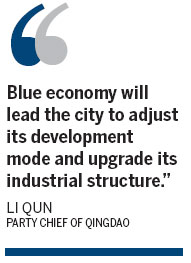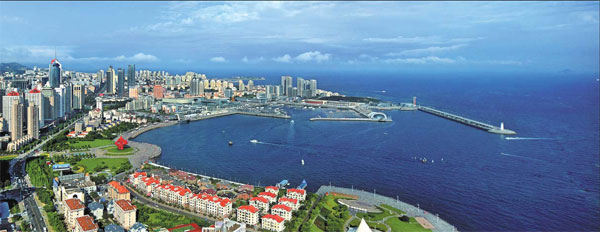'Blue economy' key to Qingdao's future
By Xie Chuanjiao in Qingdao ( China Daily )
Updated: 2013-05-27
|
|||||||||
|
Drawing on its well-established industries and rich resources, the city aims to play a leading role in marine economic development. Provided to China Daily |
Industrial parks, talent crucial to local economy
Qingdao, a coastal city in Shandong province, will be at the forefront of the drive to develop a "blue economy" in China, said a senior local official.
The blue economy is generally defined to include all marine industries, though it means much more, said Li Qun, Party chief of the city.
The 18th Party Congress, which concluded in November last year, called for the country to become a "maritime power". The country has vowed to increase input to safeguard its maritime rights and interests, develop a marine economy and better protect oceanic ecology.
"Qingdao will seize this historic opportunity," Li said. "Blue economy will lead the city to adjust its development mode and upgrade its industrial structure."
The city is home to 30 percent of the country's oceanic research institutions and about half of the top experts in marine science and technology.
More than 70 percent of academicians in oceanic fields from the Chinese Academy of Sciences and Chinese Academy of Engineering have research teams and facilities in the city.
"They have brought with them the leading marine science and technology research teams in the country to Qingdao," Li said.
Their research has laid the foundation for the city to become an international base for the biotechnology industry, shipping and oceanic engineering, he said.
To boost its marine economy, the city government has mapped out three key zones - Blue Silicon Valley, the West Coast New Economic Zone and the Hongdao Economic Zone.
Qingdao has a land area of more than 11,000 square kilometers and a coastline of about 700 km.
The vast area provides ample development space for these zones.
Qingdao will make full use of its rich talent pool to build a "Blue Silicon Valley", a world-class research and development center for marine science and technology.
In February last year, the development plan of Qingdao Blue Silicon Valley was unveiled.
With an area totaling 576 sq km, the zone is designed to host a large batch of high-tech research centers and companies specializing in marine science and technology.
An obvious reference to the technology center in the United States, the name Blue Silicon Valley is a sign of the government's ambition for it to become the driving force of cutting-edge marine science and technology development, Li said.
The West Coast New Economic Zone features several industrial parks in different fields.
With an area of more than 2,000 sq km, the zone is similar to Binhai New Area, Tianjin's large economic zone.
The zone includes a State-level economic and technological development zone, a bonded port area and an export-processing zone.
It also hosts the Sino-German Ecological Park and the China-Japan-ROK Innovation Industrial Demonstration Park.
Located across the sea from Japan and the Republic of Korea, Qingdao will benefit a lot from the potential development of a free trade area among the three countries.
"We hope to make full use of the advantages of the West Coast New Economic Zone and build it into an economic zone with the highest level of openness, the most preferential policies and the most-convenient transportation," Li said.
According to the government's strategy, by 2015, the GDP of the West Coast New Economic Zone is expected to reach 500 billion yuan ($81 billion).
And by 2020, the GDP is to exceed 1 trillion yuan.

"Our task is to make the zone grow bigger and stronger," Li said. "Our goal is to double the economic aggregate of Qingdao in five years through the development of the zone."
The third zone, the Hongdao Economic Zone, is designed to be a center for high-tech companies.
Though the city already leads the nation in the development of the blue economy, more breakthroughs are expected in many fields, Li said.
Innovation is the key to achieving breakthroughs, he said. The major difference between the blue economy and the marine economy is science and innovation.
The Qingdao government will adopt a series of policies to boost the development of the marine economy.
Preferential policies in terms of mortgages and bank loans have been implemented to help entrepreneurs to expand their businesses.
The government will also lead efforts to set up funds to finance promising startups.
Meanwhile, the city has taken steps to attract high-end talent. More than 10,000 top professionals from overseas have been attracted to the city so far.
In terms of infrastructure, Qingdao is making rapid progress in the construction of the Port of Dongjiakou and a high-speed railway linking Jinan and Qingdao.
The city will also give priority to environmental protection, Li said, adding that the government will improve local marine laws and strengthen their enforcement to protect the seas.
"We will leave the best sustainable resources to our offspring," Li said.
xiechuanjiao@chinadaily.com.cn
(China Daily 05/27/2013 page24)





